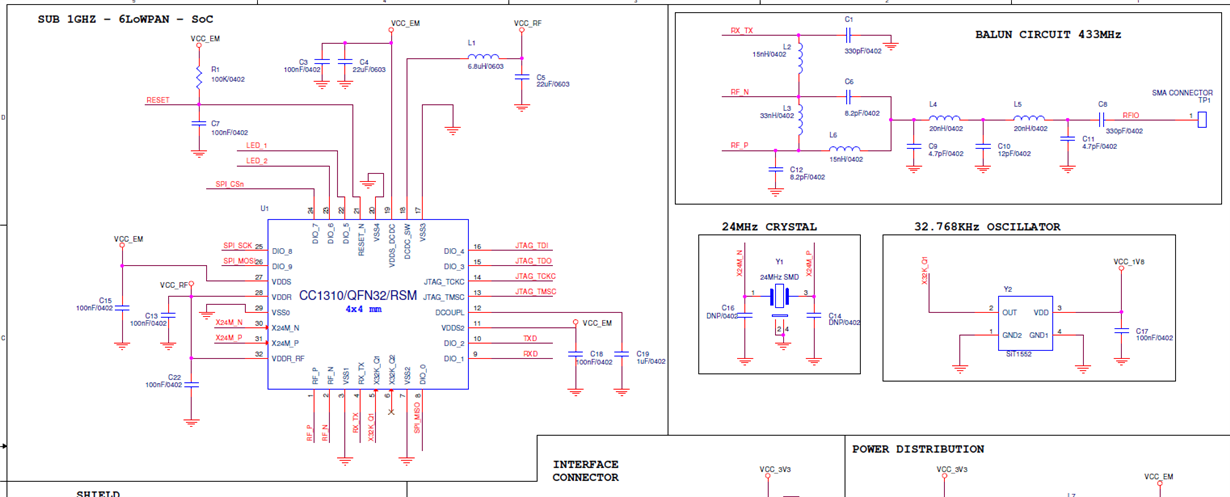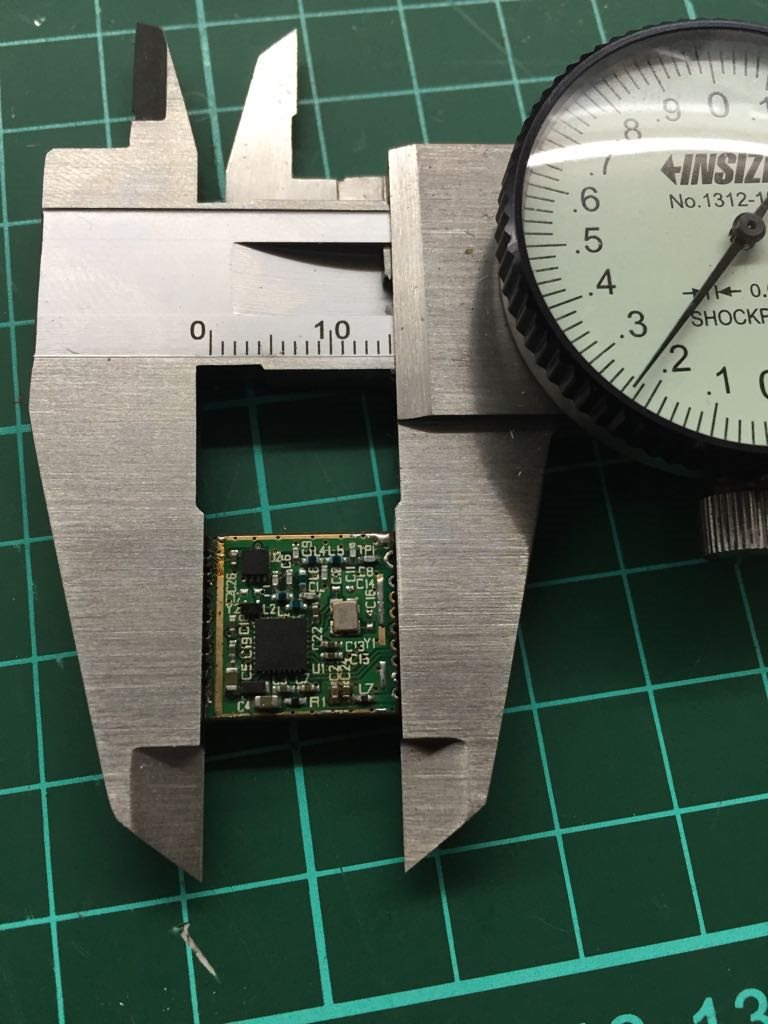Hi,
We are currently working on CC1310 running Contiki. For development purpose, we are using TI's CC1310 LaunchPad and it's work very well. The problem started once we try to make it running on our production board.
ASFAIK, CC1310 LP works only on 868MHz and 915MHz frequency. So it's different from our production board. Our production board using 4x4 package, and since we are requesting 433MHz support, we got chip revision 2.1. We have tried to adjust the pin mapping on Contiki's board.h. But I think the problem is not only related to pin mapping. Somewhere on TI publication told us that software for 2.1 is not backward compatible.
We are hoping that someone with experience on this subject can help us on this problem. Here is our modification on board.h.
--- platform/srf06-cc26xx/launchpad/cc1310/board.h
+++ platform/mcmv2/default/cc1310/board.modified.h
@@ -27,28 +27,8 @@
* ARISING IN ANY WAY OUT OF THE USE OF THIS SOFTWARE, EVEN IF ADVISED
* OF THE POSSIBILITY OF SUCH DAMAGE.
*/
+
/*---------------------------------------------------------------------------*/
-/** \addtogroup launchpad-peripherals
- * @{
- *
- * \defgroup launchpad-cc1310-specific CC1310 LaunchPad Peripherals
- *
- * Defines related to the CC1310 LaunchPad
- *
- * This file provides connectivity information on LEDs, Buttons, UART and
- * other peripherals
- *
- * This file is not meant to be modified by the user.
- * @{
- *
- * \file
- * Header file with definitions related to the I/O connections on the TI
- * CC1310 LaunchPad
- *
- * \note Do not include this file directly. It gets included by contiki-conf
- * after all relevant directives have been set.
- */
-/*---------------------------------------------------------------------------*/
#ifndef BOARD_H_
#define BOARD_H_
/*---------------------------------------------------------------------------*/
@@ -84,11 +64,13 @@
* Those values are not meant to be modified by the user
* @{
*/
-#define BOARD_IOID_LED_1 IOID_6
-#define BOARD_IOID_LED_2 IOID_7
+
+#define BOARD_IOID_LED_1 IOID_UNUSED
+#define BOARD_IOID_LED_2 IOID_UNUSED
#define BOARD_LED_1 (1 << BOARD_IOID_LED_1)
#define BOARD_LED_2 (1 << BOARD_IOID_LED_2)
#define BOARD_LED_ALL (BOARD_LED_1 | BOARD_LED_2)
+
/** @} */
/*---------------------------------------------------------------------------*/
/**
@@ -97,10 +79,10 @@
* Those values are not meant to be modified by the user
* @{
*/
-#define BOARD_IOID_UART_RX IOID_2
-#define BOARD_IOID_UART_TX IOID_3
-#define BOARD_IOID_UART_RTS IOID_18
-#define BOARD_IOID_UART_CTS IOID_19
+#define BOARD_IOID_UART_RX IOID_1
+#define BOARD_IOID_UART_TX IOID_2
+#define BOARD_IOID_UART_RTS IOID_5
+#define BOARD_IOID_UART_CTS IOID_6
#define BOARD_UART_RX (1 << BOARD_IOID_UART_RX)
#define BOARD_UART_TX (1 << BOARD_IOID_UART_TX)
#define BOARD_UART_RTS (1 << BOARD_IOID_UART_RTS)
@@ -113,8 +95,8 @@
* Those values are not meant to be modified by the user
* @{
*/
-#define BOARD_IOID_KEY_LEFT IOID_13
-#define BOARD_IOID_KEY_RIGHT IOID_14
+#define BOARD_IOID_KEY_LEFT IOID_7
+#define BOARD_IOID_KEY_RIGHT IOID_8
#define BOARD_KEY_LEFT (1 << BOARD_IOID_KEY_LEFT)
#define BOARD_KEY_RIGHT (1 << BOARD_IOID_KEY_RIGHT)
/** @} */
@@ -125,8 +107,8 @@
* Those values are not meant to be modified by the user
* @{
*/
-#define BOARD_IOID_SPI_MOSI IOID_9
-#define BOARD_IOID_SPI_MISO IOID_8
+#define BOARD_IOID_SPI_MOSI IOID_UNUSED
+#define BOARD_IOID_SPI_MISO IOID_UNUSED
/** @} */
/*---------------------------------------------------------------------------*/
/**
@@ -135,9 +117,9 @@
* Those values are not meant to be modified by the user
* @{
*/
-#define BOARD_IOID_FLASH_CS IOID_20
+#define BOARD_IOID_FLASH_CS IOID_UNUSED
#define BOARD_FLASH_CS (1 << BOARD_IOID_FLASH_CS)
-#define BOARD_IOID_SPI_CLK_FLASH IOID_10
+#define BOARD_IOID_SPI_CLK_FLASH IOID_UNUSED
/** @} */
/*---------------------------------------------------------------------------*/
/**
@@ -146,8 +128,8 @@
* Those values are not meant to be modified by the user
* @{
*/
-#define BOARD_IOID_SCL IOID_4
-#define BOARD_IOID_SDA IOID_5
+#define BOARD_IOID_SCL IOID_UNUSED
+#define BOARD_IOID_SDA IOID_UNUSED
/** @} */
/*---------------------------------------------------------------------------*/
/**
@@ -178,28 +160,18 @@
* Those values are not meant to be modified by the user
* @{
*/
-#define BOARD_IOID_CS IOID_11
-#define BOARD_IOID_TDO IOID_16
-#define BOARD_IOID_TDI IOID_17
-#define BOARD_IOID_DIO12 IOID_12
-#define BOARD_IOID_DIO15 IOID_15
-#define BOARD_IOID_DIO21 IOID_21
-#define BOARD_IOID_DIO22 IOID_22
-#define BOARD_IOID_DIO23 IOID_23
-#define BOARD_IOID_DIO24 IOID_24
-#define BOARD_IOID_DIO25 IOID_25
-#define BOARD_IOID_DIO26 IOID_26
-#define BOARD_IOID_DIO27 IOID_27
-#define BOARD_IOID_DIO28 IOID_28
-#define BOARD_IOID_DIO29 IOID_29
-#define BOARD_IOID_DIO30 IOID_30
+//#define BOARD_IOID_CS IOID_7
+#define BOARD_IOID_TDO IOID_3
+#define BOARD_IOID_TDI IOID_4
+#define BOARD_IOID_DIO9 IOID_9
+
/** @} */
/*---------------------------------------------------------------------------*/
/**
* \name Device string used on startup
* @{
*/
-#define BOARD_STRING "TI CC1310 LaunchPad"
+#define BOARD_STRING "CC1310 4x4 RSM"
/** @} */
/*---------------------------------------------------------------------------*/
Thank you very much.



